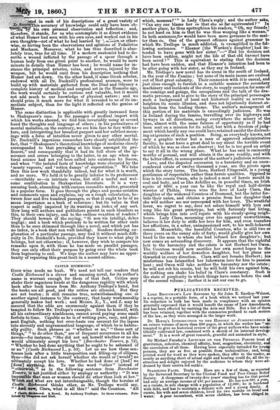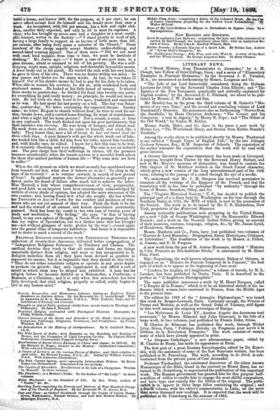PUBLICATIONS RECEIVED.
LORD BROUGHAM'S Law REFORMS by Sir John E. Eardley-Wilmot, is a reprint, in a portable form of a book which we noticed last year Its reduction in bulk has been made in compliance with an opinion generally expressed that it would benefit the cause of Law Amendment, and has been effected by omitting the Acts and Bills. But a list of them has been retained, together with the summaries prefixed to each section of the law, as they were arranged in the larger work.
Dr. Heron's INTRODUCTION TO THE HISTORY OF JURISPRUDENCE 1. an octavo volume of more than 800 pages, in which the author has " tempted to give an historical review of the great authors who have scien- tifically cultivated law, combined with a sketch of its internal develop- ment.' It is a work of great research, graceful and animated in style.
Sir Michael Faraday's LECTURES ON TIM PHYSICAL FORCES treat at gravitation, cohesion' chemical affinity, heat, magnetism, electricity, the correlation of allthese. Having been especially intended for yo persons, they are as free as possible from technicalities ; and, printed word for word as they were spoken, they offer to the reader, as nearly as anything short of actual sight and hearing could do, all the in- struction and delight enjoyed by the audience to whom they were ad- dressed by their unriva led authcr.
STARTLING Fsers. Truly so. Here are a few of them, as reported by the Reverend Secretary to the Clerical Fund and Poor Clergy Relief Society. A clergyman of twenty-five years' standing has for that period had only an average income of 44/. per annum. He has now 801. a year, as a curate, in sole charge with a population of 12,000; he is burdened with debt, and has to maintain a delicate wife and a young family. A curate, his wife and seven children, lived for two months on bread and water. A poor incumbent, with seven children, has been obliged to build a house, and borrow 3001. for the purpose, at 6 per cent; he can sever afford animal food for himself and his family more than once a week. An incumbent, with 591. per annum, has a wife and eight chil- dren, another daily expected, and only Is. 5d. to meet its expenses. A vicar, who has brought up seven sons and a daughter in a most credit- able manner, writes to the Society:—" I stand greatly in need of aid, having a large family-to support on an income of little more than 501. per annum, after being forty years a minister of the Church." Great numbers; of the clergy eagerly accept blankets, under-clothing, and second-hand wearing apparel. One of them says—" Did we not meet with such kind supplies from time to time, we must be destitute of clothing." Mr. Jervis says :—" I know a ease of one poor man, in a poor diocese, afraid or ashamed to tell of his poverty. He was a self- denying, single man, upright, religious, and charitable beyond his means. A fever broke out in his parish. He tended the sick with his own hands, he grtve to them of his own. There was no doctor within ten miles : he was parson and doctor too for many weeks. At hist, he was taken ill himself. Out of his slender means he had to pay for his duty to be taken. When able to resume his services' he did so with weakened body and straitened means. He looked at his little hoard of money. It wanted three weeks to quarter-day ; he divided his fund into twenty-one parts; for everything he paid ready money ; on principle he would not incur a debt. He had little else than bread to live upon, weakened and emaciated as he was. He had spent his last penny on a roll. The day was Satur- day, quarter-day. No letter containing the expected cheque. Sunday came : no letter. He goes to church without food, he tries to read the ser- vice, breaks down' and is carried home fainting, for want of nourishment. And what a sight did his home present! Not a crumb, a crust, or bone in. any cupboard. The truth flashed out upon his poor parishioners, that their minister was starving. He was dying of hunger, and almost mad. Re sank down on a chair, when he came to himself, and cried like a baby. They learnt that, save a bit of bread, he had not tasted food for three whole days. A poor farmer's wife got the whole truth out of him ; *he tended him like a child, fed him from her table, nursed him tenderly, and, with kindly care, he rallied. I know for a fact this ease to be true. It is certainly shocking, and very startling. The case is not an isolated one. The poor clergy bear their sufferings in silence, till the pressure becomes unendurable, when the lunatic asylum or a merciful death solves
for them that saddest problem of human Why some men are born to suffer.'"
When the old ground on which we stood securely-has mouldered away from beneath our feet, what does it behove us to do ? To cling to the hope of its recovery ? or to venture onwards in search of new ground of trust ? In spiritual matters the former alternative is generally pre- tared, under the dread of failure after much toil to achieve the latter. Mies Hennell, a lady whose comprehensiveness of view, perspicacity, and good faith as an inquirer have been unanimously acknowledged by writers of every shade of opinion, has adopted the more strenuous of the two courses; and, having found in it what she sought, she has written her Ttrouours iat Am or FAITH for the comfort and guidance of wan- derers -who are not yet assured of their way. Faith she finds to be the Ond and the reward of all earnest and honest speculation persistently punned. Such has been the result in her own case of twenty years of study and meditation. "My feeling," she says, "is that of having found, to my own sphere of thought, a North-West passage through the dim- icy region of Speculation, out to a farther issue that has brought me—not without glimpses of arctic glories by the way !—round again into the genial clime of temperate habitation. And hence it is impossible not to desire to mark a record of the track."
PRACTICAL RELIGION CONTRASTED WITH THEOLOGICAL THEORIES is a collection of twenty-four discourses delivered before congregations of "Independent Religious Reformers" in Finsbury and Chelsea. The cardinal doctrine they teach is that all creeds and forms are things essentially distinct from religion, and more or less antagonistic to it. Religion underlies them all ; they have been devised as symbols to represent its essence, but it is impossible that they should do this truly. "They do not either constitute religion or operate in any great degree to promote its growth ; they only supplement it, and afford a sort of mould in which ideas may be shaped and exhibited. A man has his religion before he becomes faithful as a Mahomedan a Confucian, a Brahmin, or a Christian; and it is only when this antecedent has been fully developed, that vital religion, properly so called, really begins to live in any human mind."
Booxs.
Travels, Researches, and Missionary Labours, during an Eighteen Pears' .Residenee in Bast ern Africa. By the Reverend Dr. J. Lewis Krapf. With an Appendix by E. G. Ravenstein, F.R.G.L. With Portrait, Maps, and Il- lustrations of Scenery and Costume.
Thoughts in Aid of Faith, gathered chiefly from recent works in Theology and Philosophy. By Sara S. Hernial.
Practical Religion contrasted with Theological Theories. Discourses by Philip William Perfitt.
Obscure Diseases of the Brain and Disorders of the Mind: their Incipient Symptoms, Pathology, Diagnosis, Treatment, and Prophylaxis. By Forbes Winslow, M.D.
An Introduction to the History of Jurisprudence. By D. Caulfield Heron. LL.D.
The Wild Sports of Indies: with Remarks on the Breeding and Rearing of Horses, and the Formation of Light Irregular Cavalry. By Captain Henry Shakespeare, Commandant Nagpore Irregular Force. Recollect eons of Baron Gros's Embassy to China and Japan, in 1857-58. By the Marquis de Moges, Attacht to the Mission. (Authorized translation.) With coloured Illustrations.
A Course of Lectures on the various Forces of Hatter, and their relation to each other. By Michael Faraday, D.C.L., &a. Edited by William Crookes, P.0.8. With numerous Illustrations.
The Irish Convict System, more especially Intermediate Prisons. By Baron Franz von Holtzendorff. Translated from the German.
The Curates of Itiversdale. Recollections in the Life of a Clergyman. Written by Himself. In three volumes.
The Firstborn; or a Mother's Trials. By theAuthor of " My Lady." In three volumes.
Helen Mordaunt : or the Standard of Life. By Mrs. Webb, Author of "Naomi," Scc. Pvc.
Startling Facts respecting the Poverty and Distress of Four Hundred Clergy- men of the Church of England . By the Reverend W. G. Jervis, M.A. Pass and Class : an Oxford Guidebook through the Course of Literie Hums- Mores Mathematics, Natural Science, and Law and Modern History. By. atosn.4gue Burrows, M.A. Middle Class Atlas : comprising a Series of Six Coloured Maps,. 7.6r the rile of Junior Candidates preparing for the Oxford Local Examuktions. By Walter M'Leod, Some of My Contrautions its Rhyme to Periodicals its Bygone Days. 1.v, *- Septuagenarian.
Nsw Knrivoris AND-REPRINTS.
Lord Broughavs's..Law Reforms : comprising the'Acts and Bills introduced or carried-by Eim`oihrough the Legislature since 1811; with an Analytical Re. view of them. By Sir John E. Eardley-Wilmot, Bart.
Kathie Brands; a Fireside History of a Quiet Life. By Hama Lee, Author of "Sylvan Molt's Daughter," Scc. The Baddington Peerage; Who Won, and who Wore it. A story of the Best and the Worst Society. By George Augustus Sala. In three volumes.



























 Previous page
Previous page